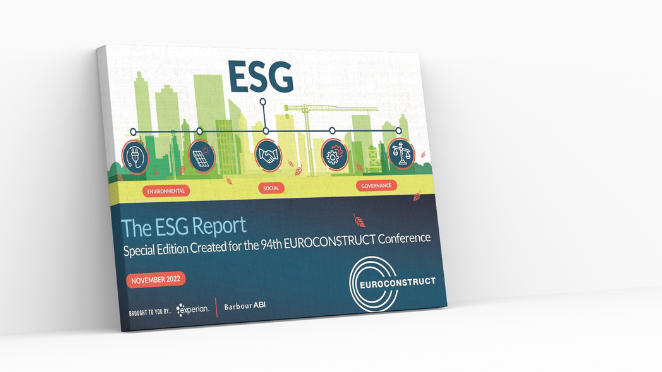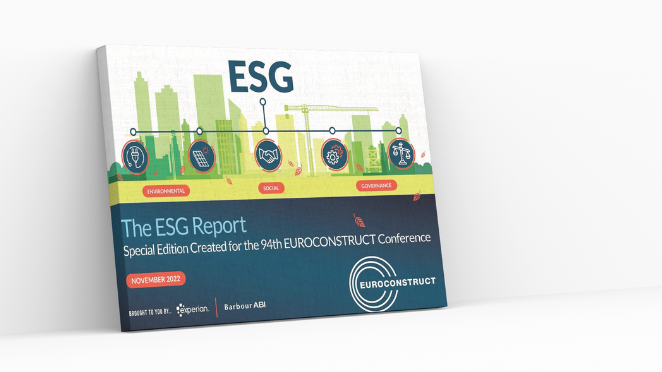
With the 94th EUROCONSTRUCT Conference almost upon us, we look to the special topic of the impact of ESG on construction that is being discussed alongside the keenly awaited sectoral forecast report presentations.
What is ESG?
Financial accounting has a very long history. The need to publicly register a business and post financial results is more recent. In the UK, Companies House, for instance, was founded in 1844. Today, however, businesses are increasingly obliged to report in detail on a growing number of non-financial issues. The trend is growing rapidly, driven both by regulation and the demands of investors. ESG, which stands for Environmental, Social and Governance, is an emerging set of non-financial measures used to gauge the impact of a business on the environment and society, and how transparent and accountable it is. A firm’s ability to demonstrate good ESG credentials is becoming increasingly important in raising investment, attracting the best employees, and preserving its brand in the eyes of its customers and the wider public. But within the world of ESG, no firm is an island.
The rising tide of ESG
As ESG advances, firms will not only be judged on their performance in house, but also by who they work with and who they work for. To succeed at the top, firms will have to prove high standards in what they do, but provide metrics on how well things are done right the way through their supply chain. This means collecting and collating data on issues as diverse as carbon emissions, waste, human rights, gender parity, and diversity within the workforce. Any gaps increasingly represent a risk. These risks will be judged by investors or those rating ESG credentials. For an industry such as construction, with highly complicated and fragmented supply chains, this poses a major challenge. As the tide of ESG rises, firms across the globe will find it ever harder to succeed without solid credentials. Many may find themselves excluded from client lists and projects and cast into a lower tier than their competitors.
What do the experts say?
During the 94th EUROCONSTRUCT CONFERENCE we will hear from an array of global experts from across the supply chain on how they are addressing ESG. In advance of the conference, we are delighted to provide the EUROCONSTRUCT community with this exclusive report, examining ESG and the challenges it poses for those operating within the construction sector.
“As ESG becomes more embedded, relationships down the supply chain will have to change, becoming much closer. This suggests firms, particularly higher up the supply chain may reduce the number of firms they deal with and concentrate less on price as they look to reduce ESG-related risk”
James Kenny, Head of Global Affairs, Arup
“There’s been a growing environmental movement at least since the seventies, but the public movement today is far bigger than I’ve ever seen before. The “E” part of ESG seems to have multiplied a hundredfold over the past three years.”
Ann Bentley, Global Board Director, RLB
“Just recently we had a FTSE-listed London based developer asking us some quite detailed questions about ESG. Arcadis is some years down that road, with a particular emphasis on issues of diversity, inclusion, and transparency. Not only had the developer made rapid progress, but they were also considering how ESG could be applied to project procurement. That suggests that the application of ESG principles could become much wider.”
Simon Rawlinson, Head of Strategic Research & Insight, Arcadis
THE ESG Report – Special Edition
created for the 94th EUROCONSTRUCT Conference
Read the full report here

